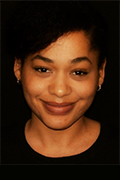The Public Manager Magazine Article
Makeda Weaver
As a human resources development specialist for the Washington, D.C., city government’s Center for Learning and Development, Makeda Weaver develops, designs, and coordinates training programs and activities for the city’s agencies and employees.
Mon Apr 10 2017
Bookmark

Since April 2015, Makeda Weaver has been a human resource development specialist with the Washington, D.C., city government. Her 10-year career in talent development also includes positions at George Washington University, Harvard Business School, and the Boston Private Industry Council.
As a human resources development specialist for the Washington, D.C., government's Center for Learning and Development, Makeda Weaver develops, designs, and coordinates training programs and activities for the city's agencies and employees. She provides career assistance, resource centers, and specific agency training in partnership with universities, vendors, and other local training institutions.
How did you get started in human resources and talent development?
In high school, my first job was as a peer leader, where I created and facilitated workshops on decision making, civic engagement, and youth leadership. While this certainly didn't make me the coolest kid in school, it did give me invaluable experience in designing interactive training sessions.
My first full-time role was managing grant-funded youth leadership programs, where I further developed curricula with easily measurable outcomes. From there, I transitioned into college readiness programming for teens. Working in higher education was a natural next step.
What are some ways your work for the District of Columbia's city government differs from your prior experience in higher education?
The biggest difference would be the scale. The District of Columbia government has nearly 38,000 employees, with an incredibly wide range of roles. We support everyone, including mechanics, policy analysts, city planners, lifeguards, and many more. As such, we often do targeted, custom programming to meet the needs of these employees and our organization overall.
Local government also has a high percentage of employees with physically demanding jobs (sanitation workers, parking enforcement, police officers, crime scene investigators), which many people are unable to continue doing as they age. We provide a pathway for these employees to transition into more senior roles so we can retain their institutional knowledge.
What are some of the most important things a talent development professional in city government can do to serve the local workforce?
Collaborate. Collaborate. Collaborate. The District of Columbia has dozens of agencies with very different missions but similar functional roles. For example, our leadership programs consist of managers from all the areas that we operate in, from budgeting and business operations to youth rehabilitation and public works.
We need to remain closely engaged with workers and management within different agencies to make sure that we meet everyone's needs. In addition to keeping current with developments in the fields of talent development and human resources, it is also necessary to stay informed about the latest local, national, and international news, as politics and current events directly affect our work.
How does your work with the D.C. government expand learning opportunities for the city's frontline employees?
As with all organizations, we are preparing our workforce to withstand the demographic shift that will occur when the Baby Boomer generation retires. The only way to do this is to develop our employees by equipping them with the skills to advance into management and leadership roles. We do this by providing learning and development programs, events, and initiatives that offer a combination of leadership development, strategic planning, and technical training.
We encourage employees to identify and acquire transferrable skills that they can use in other positions. For example, a crossing guard may have excellent communication skills that he or she wants to develop and use to pursue a position as a community outreach coordinator.
What advice would you give employees new to working in city government?
It is extremely important to be aware of your organization's mission and your role within it. Once you know these things, you can use the information to identify the skills for success in your particular area.
The mission of the D.C. Department of Human Resources is "to provide human resource management services that strengthen individual and organizational performance and enable the District government to attract, develop, and retain a well-qualified, diverse workforce." To support this mission, I need to be able to work collaboratively with employees and managers at all levels so I can be responsive to the needs of our workforce. I also need to be agile enough to respond to ongoing changes to our work brought on by current events that affect our government.



